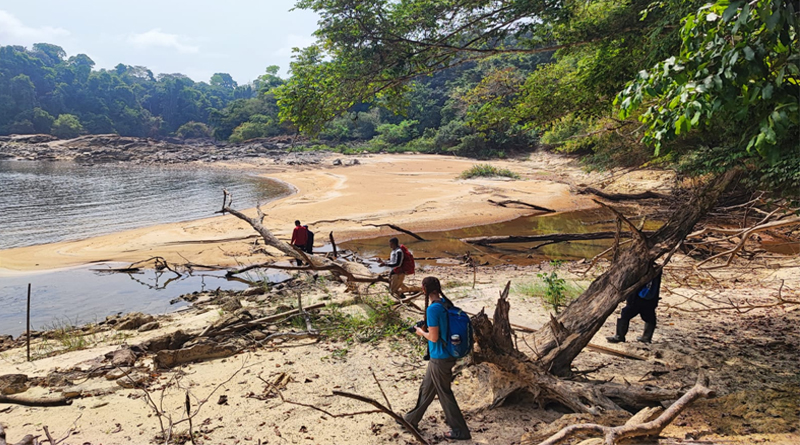EXPLORING SIERRA LEONE
Freetown is the entry-point to Sierra Leone and while there is certainly plenty to do and see there, and you could spend your entire trip just staying in the local area, but you’d be missing out if you did so. Heading into the countryside and the small villages and towns is the best way to get a genuine feel for the country, its nature, and its people.
There is no public transport, so you’ll need to book a tour or a private driver. And it’s best to do your research first or ask for help from a local company. Tacugama Chimpanzee Sanctuary, for example, is working on creating a tourism circuit to help you see some of the best of what the country has to offer. Head south from Freetown to Sorbengi-Bagrua chiefdom in the Moyamba District where you’ll find pristine mangroves and an abundance of Temne Grey parrots – a fantastic place for bird watching. Visit the beautiful Jaibui island where you can hike the forest and swim in the waters of the Moa River. Close by is Gola Rainforest which is the largest remnant of Upper Guinean tropical forest in the country. Or head north into the heights of the Loma Mountains.

Whatever you decide, make time to meet the locals and visit some of the schools where the children will be delighted to see you. These schools are always in need of new books and pens, so check before you travel if there is something useful you can bring with you to help them.
We travelled south with a team from Tacugama, stopping at the bustling town of Bo to buy provisions and then heading on along the main highway that leads to Liberia, until we reached Potoru.
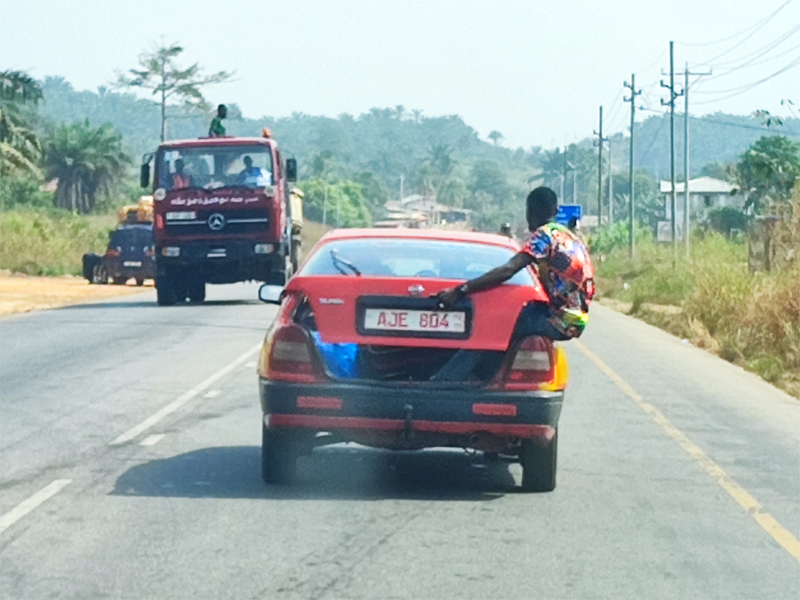
The drive itself is an experience. As most people don’t own a car, those who do can make extra money ferrying passengers around. This means you will see small cars crammed with seven or more people inside and another either hanging onto the bonnet (yes, really!) or sitting in the boot. It may not be the safest way for them to travel, but when it is the only way, needs must. There are also roadblocks every few miles, where officials will randomly pull over vehicles checking for people smugglers and contraband. These roadblocks are often just two plastic chairs with a rope slung between them that is raised or lowered depending on whether you need to stop or are allowed through.

From Potoru we took an off-road drive (well technically it was a sort of road, but it required highly skilled off road driving techniques to navigate, which fortunately our fabulous driver Gibo handled with seeming ease) to Kambama village. Then a hike, with the help of the village ladies who carried our bags on their heads, into the forest to pitch our tents. We were camping, but soon two eco lodges will be completed and you’ll be able to enjoy a river-side view, a balcony, solar generated electricity, a proper bed, and a roof over your head.
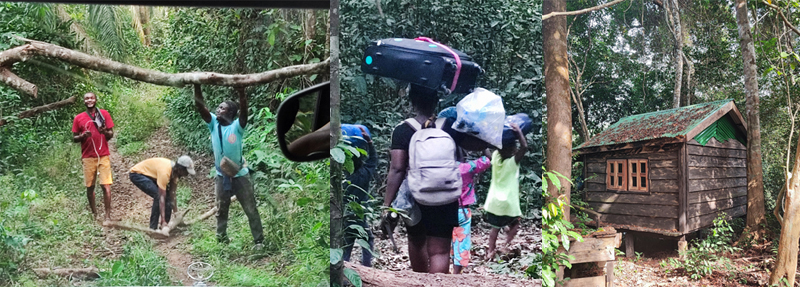
From our campsite we took a tiny dug-out canoe across the Mao River to Jaibui. This island is seldom visited making it a haven for wildlife. Butterflies in yellows, oranges, blues and deep velvety browns fluttered around us as we walked. High above we could hear the hollow, mournful cry of hornbills as we followed the bio-monitors while they checked the camera taps for sightings of chimps, pygmy hippos, civet cats and mongoose. Then after a hot, busy morning we left the trees behind and clambered across the beach to the waterfalls that separate Jaibui from Gola Rainforest. Here we threw off our sweaty clothes and jumped into the clear waters to cool off.

In nearby Waima we stopped to meet the school children and their teachers. Tacugama supports a number of the schools locally and members of our team were visiting to see how things were going, what was still needed, and to conduct a few quality checks on the teaching. The schools range from large brick buildings with proper desks and chairs, to a tiny mud hut with logs for seats and nothing much else. But the buildings aren’t the biggest challenge – it’s the teachers. There simply aren’t enough. Often there will be three different age-group classes, but just one teacher. So, while one class is receiving a lesson the other classes are sitting waiting. And many of the teachers have no training at all, so both their knowledge and their skills are lacking. But when you consider they are paid almost nothing it’s easy to see why teaching isn’t considered a plum job.
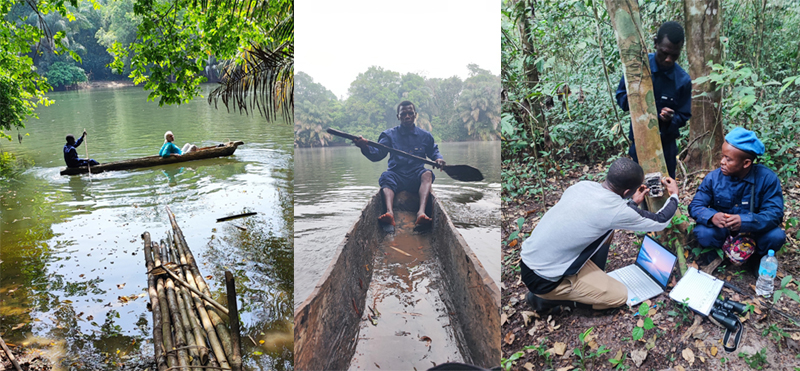
Tourists are welcome to visit the schools, and the children will be delighted to meet you. They love having their picture taken and seeing the result, and they are more than happy to show you the games they play using leaves on a twig to create a ‘helicopter’ and old tyres for running alongside. And if you have a football for them, they will love you forever! Their enthusiasm and beaming smiles are enchanting.
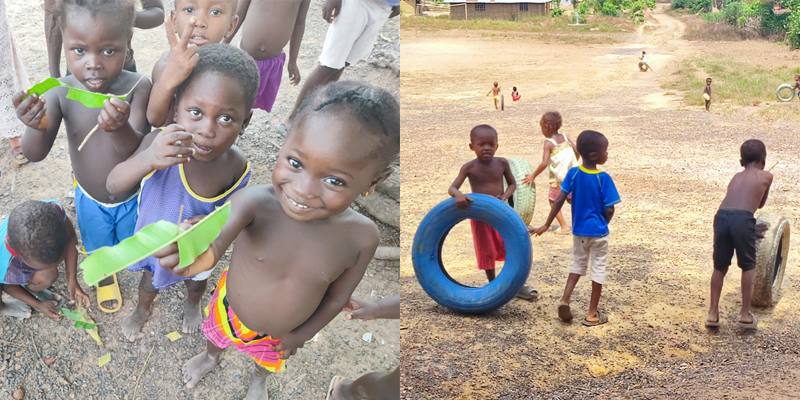
Many of these villages are very remote; there is no electricity, no well for water, no vehicles, and very few visitors. They say that in some ways they feel ‘forgotten’. Visiting them is a way to show their importance, to enhance their status and show how tourism can be, if done properly, a force for good. This helps to encourage a pride in the natural environment and the animals that also call it home. Although it is not necessary, we, as a group, chose to buy a large sack of rice as a gift for the villagers we visited. One sack is not going to make a material difference to their lives, but what it does show is our gratitude and that they are not forgotten. It was also a wonderful opportunity for us all to bond; we may not share a language or a culture, but everyone understands the beauty of a gift given and received.

Outside the capital of Freetown the current accommodation options are limited. Camping is of course possible, and once Tacugama’s eco-lodges are built these will be an option too. Other places like Tasso Island and Tiwai Island also have eco lodges and I’d suggest moving around so you see as much of the country as possible. There are also plenty of roadside guesthouses, but be warned, these are very ‘rustic’. We stayed in one at Potoru. A room, with a bed (nothing else) is around $5 a night. There is a bathroom with a toilet that required a bucket of water to flush it. There are no showers or electricity, but a couple of doors down you can pay to have your phone charged in a little hut with a generator. If you plan to stay in a local guest house, I’d suggest bringing a sheet or sleeping bag liner as the bed is not laundered regularly.
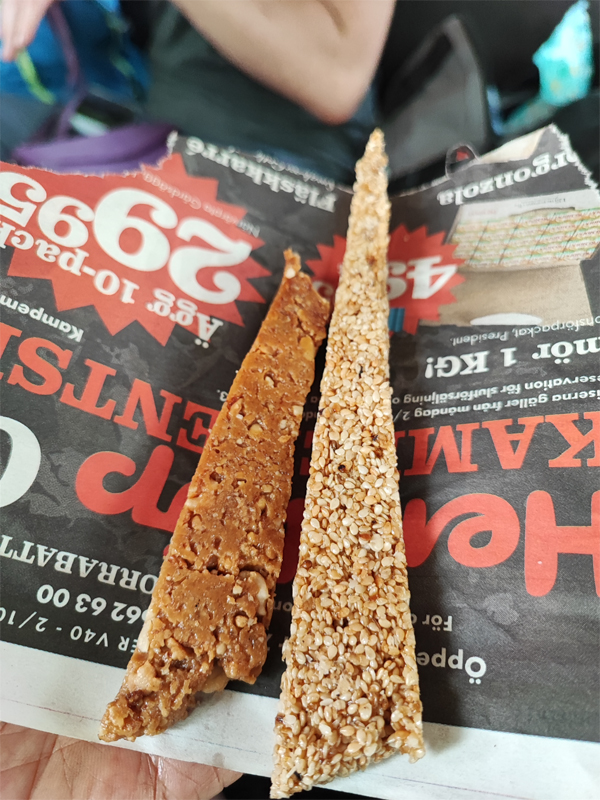
Buying water (always make sure you have plenty to hand) and snacks is seldom a problem, especially in the larger towns. Even in Potoru a lady appeared each afternoon with a cool box stuffed with bottles of water, coke, tonic and tango. And in larger places you’ll see women and children with giant plastic tubs on their heads filled with a variety of street-food snacks. We tried Bennie (sesame snaps) and Groundnut Cake – both are delicious and provide a well needed energy boost in hot, sweaty weather. Also look out for Agidie, which is made with pounded corn and sugar and then wrapped in a banana leaf and steamed. Although there aren’t restaurants as we’d know them, the local ladies are very willing to cook up some dinner for you, if required. Our favourite was Tangajese, a traditional dish of the local Mende people made with onion, tomato, aubergine, and groundnuts (peanuts). It was served with potatoes and casava, and was mouth-wateringly delicious. So good, in fact, that we ate it a lot!
Sierra Leone’s tourism infrastructure may be in its infancy, but in many ways this makes it even more enchanting. If you’d like to experience a destination before the glossy magazines and smug journalists arrive, before the plane loads of tourists looking for western food and imported beer, and before the local traditions have been watered down to accommodate the hordes, then now is the time to visit Sierra Leone.
FACT BOX
Tacugama Chimpanzee Sanctuary – tacugama.com
Gola Rainforest – golarainforest.org
Loma Mountains – tourismsierraleone.com/where-to-go/loma-mountains-and-mount-bintumani/
Tiwai Island – tiwaiisland.org
Tasso Island – tassoisland.org/visit
Sierra Leone Tourism – tourismsierraleone.com
ABOUT THE AUTHOR
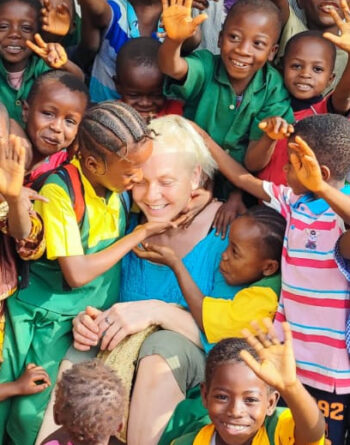 Chantal Cooke is an award-winning journalist and broadcaster and co-founder of PASSION for the PLANET.
Chantal Cooke is an award-winning journalist and broadcaster and co-founder of PASSION for the PLANET.
Chantal is passionate about tourism being used as a force for good.
You can follow her adventures on Facebook and X/Twitter @chantalcooke and on Instagram @Chantaldcooke

